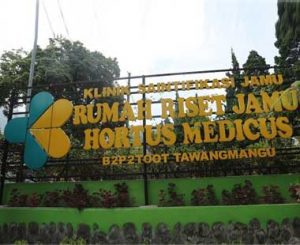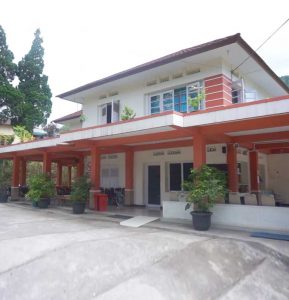Traditional and Modern Medicine Synergy at the Hortus Medicus Clinic
"Things that have been contested for so long turn out can go hand in hand. In the end, it’s the goal that matters. In medicine, we are not looking for right and wrong, we are looking for patients’ goodness"Published by : Kurnia HD - 20/05/2020 22:03 WIB
5 Minutes read.
Hortus Medicus Clinic is a facility of B2P2TOOT. Hortus means plant and medicus means medicine, so Hortus Medicus means a garden of medicinal plants. Yes, the B2P2TOOT herbal medicine clinic belonging is indeed has the same name as the medicinal plants and herbal plantations. Different from medical clinics in general, the Hortus Medicus clinic applied medicinal plants and jamu for its patients. Through a research and scientific evidence related to the safety and efficacy, the medicinal plants then applied to people as clinical trials.

Image source: http://www.b2p2toot.litbang.kemkes.go.id/
The Hortus Medicus Clinic is a lembaga balai besar (an Indonesian government institution with certain tasks) that makes the clinic a laboratory and research center. Supported by an integrated laboratory to research medicinal plants, this clinic has been conducting community-based research since 2007. The research subjects are patients who come to the clinic. From the research conducted, 12 standardized ingredients have been produced, the results of which have been reviewed by the Komisi Saintifikasi Jamu Nasional (the National Jamu ‘Scientification’ Commission).
“The Hortus Medicus Clinic and B2P2TOOT are a lembaga balai besar. Apart from being a clinic, we also regarded it as our laboratory and research center. We also have an integrated laboratory for medicinal plants researches. The Hortus Medicus herbal clinic itself was inaugurated by the Ministry of Health in 2013. But, previously, we have been carrying out community-based research/community service from 2007. We have already accepted patients as research subjects. From the research there have been 12 standardized ingredients, the results have been reviewed by the Komisi Saintifikasi Jamu Nasional, “explained Akhmad Saikhu.
Doctors in Hortus Medicus have received training and participated in researches. In total there are 590 doctors, some are active and inactive. To be able to get access to herbs or herbal medicines provided by the clinic, doctors are required to report the results of using herbs from the Hortus Medicus for further analysis. Of course, the doctor will determine the type of drugs. The doctor will select, sort, and provide advice according to the patient’s condition. Patients with minor illnesses, such as mild high blood pressure or light diabetes, should be prescribed jamu. However, if the disease is severe and the research on herbal medicine has not led to it, jamu is used as a complement or additional therapy.
The principle treatment at the Hortus Medicus clinic is not to conflict between modern medicine and medicine through herbs and herbal medicine because both have their own characteristics. Both can be synergized according to the patient’s condition with the main consideration being the patient’s safety.
“Side by side between the modern and the jamu, both synergize with each other. Which type of jamu is given, the doctor will know later. Oh, the possibility of which herbal and modern medicine interactions, all that which are not allowed according to the patient’s condition. The main principle is patients’ safety. If a patient complains, for example, refusing a chemical drug, we, as doctors, must first provide an explanation for the condition of his/her illness. For example, if a patient had cancer, we have to explain that he/he should underwent a surgery, if he/she should have a chemo then a chemo should be applied. Well, the herbs can be used as a companion to deal with the chemo so that you don’t suffer nauseous feeling. Side by side does not mean to replace, “explained dr. Danang Ardianto, one of the doctors on duty at the Hortus Medicus Clinic.

Hortus Medicus Clinic
Patients visiting the Hortus Medicus Clinic are dominated by middle-aged patients aged 40-60 years with age-related degenerative diseases, such as high blood pressure, gout, cholesterol, and arthritis. Most of these diseases do require long-term therapy. This of course fits in with the herb researches developed by the Hortus Medicus.
“The focus of our formula researches is indeed toward the direction. So, what is suitable is the recipe toward that way. For infectious diseases or emergencies that require quick help and are time-related, in collaboration with modern medicine, jamu has another role for its healthy side. For example, tuberculosis. Tuberculosis cannot be treated with herbal medicine. TB should be treated with Anti-Tuberculosis Drugs (OAT). Taking anti-tuberculosis (OAT) drugs for a long term (6 months) can cause liver damage, so herbs can protect liver function. For lack of appetite problem, herbal medicine can increase appetite, increase endurance. The role is as such, the synergy. So, it should not be contested, if possible, the integration of a combination of cooperation with the existing one, modern and traditional ones will develop together, “explained dr. Danang Ardiyanto, Coordinator of the Hortus Medicus Clinic.








